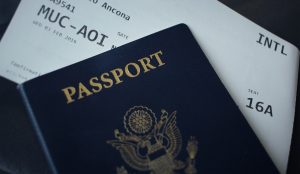The Ultimate Traveler’s Guide to Psychological Resilience and Global Adaptation
Traveling is an exciting and enriching experience that allows us to explore new cultures, taste different cuisines, and create unforgettable memories. While it may seem like a dream come true, traveling also comes with its own set of challenges and obstacles that can test our mental and emotional resilience. From delayed flights to language barriers, adapting to unfamiliar environments can be overwhelming for even the most seasoned travelers. That’s where psychological resilience and global adaptation come into play. In this ultimate traveler’s guide, we’ll discuss how to cultivate resilience and adaptability, ensuring that your journey is not only enjoyable but also empowering. 
Cultivating Psychological Resilience
Resilience refers to the ability to bounce back from difficult situations and adapt to changes. It’s a crucial trait that can help us cope with the unpredictable nature of travel and the challenges it presents. While some people may be naturally more resilient, it’s a skill that can be learned and strengthened through practice. Here are some tips on how to cultivate psychological resilience before and during your travels:
Plan Ahead and Be Flexible
One of the biggest sources of travel-related stress is unexpected changes and situations. While you can’t plan for everything, it’s essential to do your research and prepare for potential challenges. This includes having a backup plan for flights, accommodations, and transportation, as well as familiarizing yourself with local customs and laws. However, it’s also crucial to be flexible and open to changes. It’s easy to get discouraged when things don’t go according to plan, but being adaptable can help you roll with the punches and find alternative solutions.
Practice Mindfulness
Mindfulness is the practice of being fully present and aware of your thoughts, feelings, and surroundings. It can help you stay calm and grounded in the face of unexpected or stressful situations. Whether it’s through meditation, journaling, or simply taking a few deep breaths, incorporating mindfulness into your daily routine can improve your overall resilience and well-being.
Adopt a Positive Mindset
Attitude is everything, especially when it comes to resilience. Instead of viewing challenges as setbacks, try to see them as opportunities for growth and learning. Focusing on the positives, no matter how small they may seem, can help you stay motivated and resilient throughout your travels.
Lean on Your Support System
Traveling solo can be an incredible experience, but it can also be lonely and overwhelming at times. That’s why it’s essential to have a strong support system in place. Keep in touch with friends and family back home, and don’t be afraid to reach out to fellow travelers or locals for support. Surrounding yourself with positive and supportive people can make all the difference in your resilience and adaptability while on the road.
Adapting to Global Environments
In addition to psychological resilience, being able to adapt to new cultural and environmental conditions is crucial while traveling. Adapting not only helps you navigate through unfamiliar territory, but it also allows you to gain a deeper understanding and appreciation of the places you visit. Here are some ways to enhance your global adaptation:
Be Open-Minded and Respectful
Traveling exposes us to different customs, beliefs, and ways of life. Embracing these differences with an open mind and an attitude of respect can make your travels more enriching and memorable. Before you travel, do some research on the cultural norms and etiquette of the destinations you’ll be visiting to avoid any unintentional cultural faux pas.
Try New Things
Stepping out of your comfort zone is a surefire way to enhance your adaptability. Whether it’s trying a new food, learning a local dance, or engaging in a new activity, pushing yourself to try new things can help you gain a better understanding of the culture and its people.
Learn the Language
Knowing a few key phrases in the local language can make a significant difference in how you’re perceived and how well you’re able to navigate through a foreign country. While it’s not necessary to become fluent, learning simple greetings and basic phrases can go a long way in creating meaningful connections with locals.
Be Patient
Adapting to new environments takes time and patience, so try not to get frustrated if things don’t go as smoothly as you’d hoped. Remember to take breaks, stay hydrated, and practice self-care to avoid burnout.
Traveling is not just about visiting new places; it’s also about personal growth and self-discovery. By cultivating psychological resilience and enhancing your global adaptability, you’ll not only overcome any challenges that come your way, but you’ll also come back home with a greater sense of confidence and a deeper understanding of yourself and the world around you. So go out there, explore, and embrace all that travel has to offer – you’re more resilient and adaptable than you think!











